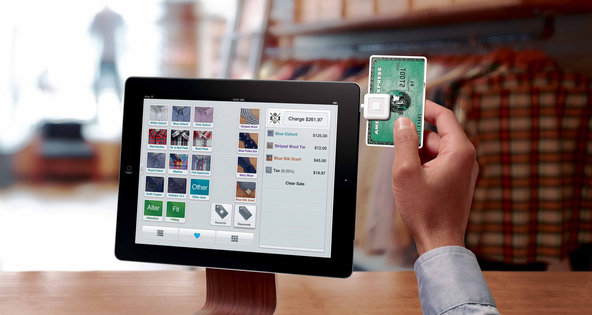 Square Register uses the company’s reader and an app to turn an iPad into a credit card register.
Square Register uses the company’s reader and an app to turn an iPad into a credit card register.
It’s not exactly a hip question right now. But what exactly is Square?
Excitement is building around the payments company, which is led by Jack Dorsey, Twitter’s co-founder. It’s close to raising $200 million of new capital, and Starbucks said in early August that it was going to use Square’s technology.
Disappointed by Facebook and Groupon, technology industry watchers at least have hope for Square. It’s easy to see how nifty card readers and other innovations can make payments much easier for small businesses and their customers. Meanwhile, the Starbucks deal raises the prospect that other large retailers may partner with Square.
But it may too early to anoint Square as the firm that will lead us into a cashless society. The main issue with Square is that it’s not yet clear what it wants to be.
Yes, on the surface, it’s a company that provides payments to hardware and software to merchants. But it may struggle to achieve burgeoning profits from the payments fees paid by merchants, according to an analysis of the economics of those payments.
Square is almost certainly working to develop a much bigger revenue source. The success of that will likely determine the success or failure of Square.
As innovative as Square is, it cannot easily get around the established fixed costs charged by the payments industry, which comprises processing companies, banks and firms like Visa and MasterCard.
Square charges merchants 2.75 percent of the amount transacted when a card is swiped, or $275 a month. That’s at the low end of the fee scale. But it may also be too low for Square to a profit on payments below $10, which are a big part of Square’s business.
Nebo Djurdjevic, chief executive of Cardis International, shows why. He simply calculates the money Square would take in with a 2.75 percent fee on a transaction and then compares that with the money it would have to pay out in fees to credit card companies and processors. (As a note, Cardis has its own product, which aims to cut the costs of smaller credit card payments.)
On a $5 transaction, Square would get 2.75 percent of $5, or 14 cents. But, citing public fee data, Mr. Djurdjevic calculates that, with a premium Visa card, Square would have to pay out 27 cents in fees. The theoretical loss to Square would therefore be 13 cents. The loss may be lower on other types of cards, according to Mr. Djurdjevic, who nevertheless thinks the Starbucks deal is a positive development for Square.
Square declined to comment on Mr. Djurdjevic’s numbers and their significance for Square’s business model.
The challenging economics won’t be a surprise to Square watchers. Enthusiasts may argue – correctly – that Square will make money on each payment that is over $10. And if Square gets picked up by larger retailers, larger payments may make up a large share of its business. Square may even have software that allows it to reduce slightly the amount it has to pay to card operators.
So what will the big, alternative revenue source be? Recent investors in Square must see one, given that the company now has an estimated valuation of $3.25 billion.
The company probably wants to take all the payment data and use it to help merchants with their marketing. Square might, say, take a cut of any business generated from that marketing. In other words, it may aim to be a more sophisticated version of Groupon. Square’s fans may say that, with a wealth of payments data, the company can do better than Groupon.
The more merchants that use Square’s payments system, the more data it will have. And with its low fees, Square may well draw in large numbers of merchants.
But as Mr. Djurdjevic’s numbers show, those low fees can also generate losses. And it’s not like other companies are standing still. For instance, PayPal and Discover recently announced that PayPal customers will next year be able to use the service in stores, not just online.
In all, it’s too early to tell whether Square is leading us, or itself, into a cashless future.
Article source: http://dealbook.nytimes.com/2012/08/31/can-square-remain-hip/?partner=rss&emc=rss
Speak Your Mind
You must be logged in to post a comment.